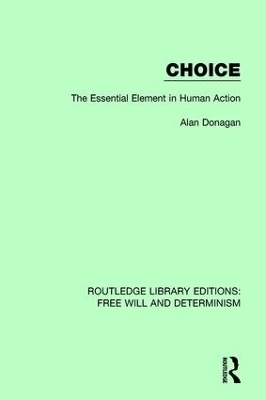
Choice
The Essential Element in Human Action
Seiten
2017
Routledge (Verlag)
978-1-138-63513-5 (ISBN)
Routledge (Verlag)
978-1-138-63513-5 (ISBN)
This book, first published in 1987, investigates what distinguishes human behaviour that is action (praxis) from the part that is not. The distinction was drawn by Socrates, but key elements became obscured in modern philosophy.This study recovers those elements, and analyses them in terms of a defensible semantics on Fregean lines.
This book, first published in 1987, investigates what distinguishes the part of human behaviour that is action (praxis) from the part that is not. The distinction was clearly drawn by Socrates, and developed by Aristotle and the medievals, but key elements of their work became obscured in modern philosophy, and were not fully recovered when, under Wittgenstein’s influence, the theory of action was revived in analytical philosophy. This study aims to recover those elements, and to analyse them in terms of a defensible semantics on Fregean lines. Among its conclusions: that actions are bodily or mental events that are causally explained by their doers’ propositional attitudes, especially by their choices or fully specific intentions; that choice cannot be reduced to desire and belief, and hence that the traditional concept of will as intellectual appetite must be revived.
This book, first published in 1987, investigates what distinguishes the part of human behaviour that is action (praxis) from the part that is not. The distinction was clearly drawn by Socrates, and developed by Aristotle and the medievals, but key elements of their work became obscured in modern philosophy, and were not fully recovered when, under Wittgenstein’s influence, the theory of action was revived in analytical philosophy. This study aims to recover those elements, and to analyse them in terms of a defensible semantics on Fregean lines. Among its conclusions: that actions are bodily or mental events that are causally explained by their doers’ propositional attitudes, especially by their choices or fully specific intentions; that choice cannot be reduced to desire and belief, and hence that the traditional concept of will as intellectual appetite must be revived.
Alan Donagan
1. Rational Animals and their Actions 1.1. The Socratic Tradition in the Theory of Human Action 1.2. Should the Socratic Tradition Be Jettisoned as Folk Psychology? 1.3. Plan For An Investigation of Human Action on Socratic Lines 2. Actions as Individual Events 3. Oexis and Doxa 4. Propositional Attitudes: Frege’s Semantics Revised 5. Choosing and Doing 6. Intending 7. Rationalizing and Explaining 8. Will and Intellect 9. Agency 10. Freedom of Choice
| Erscheinungsdatum | 01.07.2017 |
|---|---|
| Reihe/Serie | Routledge Library Editions: Free Will and Determinism |
| Verlagsort | London |
| Sprache | englisch |
| Maße | 156 x 234 mm |
| Gewicht | 453 g |
| Themenwelt | Geisteswissenschaften ► Philosophie ► Erkenntnistheorie / Wissenschaftstheorie |
| Geisteswissenschaften ► Philosophie ► Ethik | |
| Geisteswissenschaften ► Philosophie ► Philosophie der Neuzeit | |
| Geisteswissenschaften ► Psychologie ► Allgemeine Psychologie | |
| Geisteswissenschaften ► Psychologie ► Verhaltenstherapie | |
| ISBN-10 | 1-138-63513-8 / 1138635138 |
| ISBN-13 | 978-1-138-63513-5 / 9781138635135 |
| Zustand | Neuware |
| Haben Sie eine Frage zum Produkt? |
Mehr entdecken
aus dem Bereich
aus dem Bereich
die Grundlegung der modernen Philosophie
Buch | Softcover (2023)
C.H.Beck (Verlag)
18,00 €
Buch | Softcover (2023)
Reclam, Philipp (Verlag)
7,00 €

![Was heißt Denken?. Vorlesung Wintersemester 1951/52. [Was bedeutet das alles?] - Martin Heidegger](/media/113619842)
